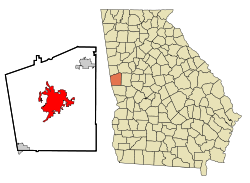La Grange, Georgia
| LaGrange, Georgia | |
|---|---|
| City | |

A statue of the Marquis de LaFayette is mounted on a central fountain in LaGrange's LaFayette Square.
|
|
 Location in Troup County and the state of Georgia |
|
| Coordinates: 33°2′12″N 85°01′55″W / 33.03667°N 85.03194°WCoordinates: 33°2′12″N 85°01′55″W / 33.03667°N 85.03194°W | |
| Country | United States of America |
| State | Georgia |
| County | Troup |
| Government | |
| • Mayor | Jim Thornton |
| Area | |
| • Total | 29.5 sq mi (76.5 km2) |
| • Land | 29.0 sq mi (75.0 km2) |
| • Water | 0.6 sq mi (1.5 km2) |
| Elevation | 781 ft (238 m) |
| Population (2012) | |
| • Total | 30,478 |
| • Density | 1,033/sq mi (398/km2) |
| Time zone | EST (UTC-5) |
| • Summer (DST) | EDT (UTC-4) |
| ZIP codes | 30240, 30241, 30261 |
| Area code(s) | 706 |
| FIPS code | 13-44340 |
| GNIS feature ID | 0316522 |
| Website | LaGrange-GA |
LaGrange is a city and the county seat of Troup County, Georgia, United States. The population of the city was estimated to be 30,452 in 2013 by the U.S. Census Bureau. It is the principal city of the LaGrange, Georgia Micropolitan Statistical Area, which is included in the Atlanta-Sandy Springs-Gainesville, Georgia-Alabama (part) Combined Statistical Area. It is about 60 miles southwest of Atlanta and located in the foothills of the Georgia Piedmont.
LaGrange is home to LaGrange College, the oldest private college in the state. Started as a girls' academy, it has been affiliated since the late 19th century with the Methodist Church, and what is now the North Georgia Conference of the United Methodist Church. The city's proximity to West Point Lake, a few miles to the west, helps attract bass fishermen and water sports enthusiasts to the city.
The Troup County Courthouse, Annex, and Jail, built in 1939, is one of LaGrange's properties that is listed on the National Register of Historic Places.
LaGrange is named after the country estate near Paris of the wife of the Marquis de La Fayette. When La Fayette, a Revolutionary War hero, visited Georgia in 1825 on a national tour, he remarked on the similarity of local topography to his wife's property.
The European-American settlement of LaGrange began in the early 19th century, soon after the territory was ceded to the United States by the Creek Indians and the territorial legislature established Troup County. The city was incorporated in December 1828. The area was developed for cotton plantations, and planters migrating from the eastern areas of the South brought along or bought enslaved African Americans in the domestic slave trade to use as laborers.
...
Wikipedia
